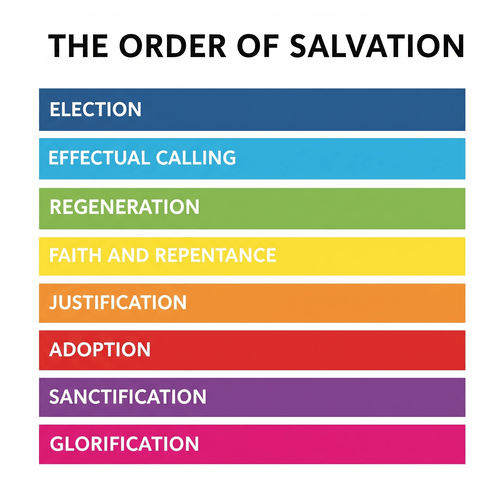Order of Salvation: At What Point Can I Call Myself Christian?
Picture this: A teenager walks down the aisle at summer camp, prays a prayer, and gets baptised. A church-going teenager receives the first communion. A seeker reads Scripture and suddenly believes. An infant is sprinkled with water. Which of these people can legitimately call themselves Christian? When exactly does someone cross the line from non-Christian to Christian?
This isn’t just theological hair-splitting—it’s a question with eternal significance and profound pastoral implications. Thankfully, Scripture provides clarity through what theologians call the “order of salvation” (the ordo salutis). Join us as we explore the Reformed tradition’s biblically faithful answer.
UNDERSTANDING THE ORDER OF SALVATION
The order of salvation describes how God saves sinners, breaking down salvation into distinct but unified aspects. Reformed theology recognises both a logical order (how these elements relate to each other) and the reality that these elements can, and often do, occur simultaneously in experience.
The classical Reformed sequence unfolds as follows:
- Election (God’s eternal choice)
- Effectual Calling (God’s irresistible summons)
- Regeneration (spiritual rebirth)
- Faith and Repentance (our response)
- Justification (legal declaration of righteousness)
- Adoption (becoming God’s children)
- Sanctification (lifelong growth in holiness)
- Glorification (final perfection).
But here’s the crucial question: At which point does someone actually become a Christian?
THE CRITICAL MOMENT: REGENERATION
According to Scripture and Reformed theology, we become Christian at the moment of regeneration—when God makes us spiritually alive. This happens before we exercise faith, not because of it.
Jesus made this clear to Nicodemus: “Unless one is born again he cannot see the kingdom of God” (John 3:3). Notice the order—being born again comes before seeing or entering God’s kingdom. You must first receive new spiritual life before you can respond in faith. Paul reinforces this in Ephesians 2:1-5, explaining that God “made us alive together with Christ” while we were still “dead in our trespasses.”
First John 5:1 provides perhaps the clearest statement: “Everyone who believes that Jesus is the Christ has been born of God.” The verb tense is crucial—those who presently believe have already been born of God. Regeneration precedes and enables faith.
Why is regeneration the decisive moment? Because it’s when God creates new spiritual life where none existed before. The unregenerate person is “dead in trespasses and sins” (Ephesians 2:1)—spiritually incapable of responding to God. But regeneration changes everything. It makes us a “new creation” (2 Corinthians 5:17), fundamentally altering our nature and enabling us to believe.
This isn’t merely academic. Regeneration is permanent and irreversible. Once God imparts spiritual life, we possess it forever. We may not all feel different initially, but we are ontologically different—we have crossed from death to life.
FAITH AS EVIDENCE, NOT CAUSE
This raises an obvious objection: “But I didn’t feel regenerated before I believed!” That’s precisely the point. Faith is regeneration becoming conscious of itself. It’s the first act of our new spiritual nature.
Think of it this way: faith doesn’t create new life; new life creates faith. Faith is the instrument by which we receive salvation’s benefits, not the ground of salvation itself. Romans 3:28 says we’re justified “by faith,” not “because of faith”—a crucial distinction.
In experience, regeneration and faith happen simultaneously. We don’t feel ourselves being regenerated, then later choose to believe. Rather, we suddenly find ourselves believing because we’ve been made spiritually alive. Faith is evidence that regeneration has already occurred.
ADDRESSING COMMON MISCONCEPTIONS
Evangelicals mistakenly often tend to locate the moment of becoming Christian elsewhere:
- Some say, “I became Christian when I prayed the sinner’s prayer.” But prayer doesn’t create new life—new life creates the desire and ability to pray. The prayer may coincide with regeneration, but it doesn’t cause it.
- Others point to baptism. While baptism is a crucial ordinance, it signifies what has already occurred spiritually. It’s the visible sign of invisible grace, marking you as part of the visible church, but the spiritual reality precedes the physical symbol.
- Perhaps most commonly, people say, “I chose Jesus and became a Christian.” But this reverses the biblical order. John 15:16 records Jesus saying, “You did not choose me, but I chose you.” Your choice flows from your new nature; it doesn’t create that nature.
PRACTICAL IMPLICATIONS
Understanding this brings tremendous pastoral benefits.
- For personal assurance, we look to our present faith, love for God, and spiritual fruit—not to finding the exact moment of conversion. Many believers torment themselves trying to pinpoint when they “really” got saved. But if we presently trust Christ, we can be confident we’ve been regenerated, regardless of when or how dramatically it occurred.
- For evangelism, this understanding keeps us focused on preaching the gospel while trusting the Holy Spirit to regenerate hearts. We call people to faith and repentance as evidence of new life, not as means of creating it.
- For discipleship, let’s remember our new nature doesn’t mean instant maturity. The regenerate believer still struggles with sin and grows gradually in sanctification. Don’t mistake spiritual immaturity for our unregenerate condition.
THE BOTTOM LINE
We become Christian at the moment God regenerates us—makes us spiritually alive. This typically coincides with our first exercise of faith, but regeneration is the underlying reality that makes faith possible. Faith, repentance, and other responses flow from this new spiritual life.
This view provides both biblical fidelity and pastoral comfort. We don’t become Christian by praying a prayer, walking an aisle, or being baptised—though these may accompany salvation. We become Christian when the Holy Spirit imparts new life, evidenced by genuine faith in Jesus Christ.
ORDER OF SALVATION: RELATED FAQs
What about infant baptism? Are baptised babies already Christians? John Calvin and Charles Hodge distinguished between covenant membership and regeneration. Baptised infants are part of the visible church and covenant community, but they become Christians individually when God regenerates them—which may happen in infancy, childhood, or later. The sacrament marks covenant inclusion, not the moment of spiritual rebirth.
- Can one be regenerated but not yet believe? How long is the gap? Reformed theologians like Louis Berkhof argue that while regeneration logically precedes faith, the gap is practically non-existent in conscious beings. RC Sproul compared it to lightning and thunder—distinct but virtually simultaneous. However, some suggest regeneration might occur in infancy or unconscious states, with faith emerging when the person becomes capable of a conscious response.
- What about people who “lose their faith” later? Were they never really Christians? According to Reformed doctrine, truly regenerated individuals cannot lose salvation (perseverance of the saints). John Owen and John MacArthur explain those who permanently abandon faith likely experienced temporary enthusiasm rather than genuine regeneration. However, true believers may experience seasons of doubt or backsliding while retaining their regenerate nature deep down.
How does this view affect evangelism? Should we still call people to “accept Jesus”? Evangelists like George Whitefield and Charles Spurgeon still urgently called people to faith and repentance, knowing God uses these means to awaken the regenerate heart. We preach to everyone because we don’t know whom God has chosen or when He’ll regenerate them. The call to “accept Jesus” isn’t wrong if understood as evidence of regeneration rather than its cause.
- What about gradual conversion versus dramatic conversion experiences? The Reformed perspective accommodates both patterns. Scholars like Sinclair Ferguson note that some (like Timothy) seem to believe from earliest memory, suggesting early regeneration, while others (like Paul) experience dramatic adult conversion. The key isn’t the drama or timing but whether genuine regeneration has occurred, evidenced by lasting faith and spiritual fruit.
- Do Reformed scholars agree on every detail of the order of salvation? No, there are nuanced debates within Reformed theology. John Murray questioned whether regeneration and faith can be strictly separated, preferring to speak of “regeneration-faith” as one complex reality. Others debate whether justification and adoption are simultaneous or sequential. However, all agree regeneration precedes any human contribution to salvation.
What about deathbed conversions? Are they genuine? Scholars like JI Packer acknowledge genuine last-minute regeneration is possible—the thief on the cross being the prime example. However, they caution against presuming upon God’s grace. True deathbed conversion produces genuine repentance and faith, even if there’s no time to demonstrate fruit. The absence of subsequent holy living makes assessment difficult but doesn’t invalidate genuine regeneration.
ORDER OF SALVATION: OUR RELATED POSTS
- The Ordo Salutis: What are the Seven Steps in Our Salvation?
- Can a Sinner be Saved from Sin’s Consequences? Is There Hope?
- Consequences of Sin in Genesis 3: Fall and Redemption
- Salvation: By Faith Or Works? Or Both?
- Assurance of Salvation: Can I Really Know I’m Saved?
- Why Does God Show Grace to Some Sinners and Send Others to Hell?
- God’s Foreknowledge: Far More Than Mere Foresight
Editor's Pick

What Makes a Godly Mom? A Scripture-Backed Guide
In our culture’s confusion about gender roles and parenting, the timeless question remains: what makes a godly mother? While secular [...]

Paul’s Mandate for Men: Headship Or Servant Leadership? Or Both?
Modern Christianity has fallen into a trap. We've created an either/or battle between "headship" and "servant leadership," as if these [...]

Should We Stop Using Male Pronouns for God? Why Do We Say No?
A friend of ours arrived eagerly at his first theology class in seminary. But he quickly discovered something troubling: the [...]

Did Old Testament Law Force Women to Marry their Rapists?
**Editor’s Note: This post is part of our series, ‘Satan’s Lies: Common Deceptions in the Church Today’… Viral misinformation abounds [...]

From Danvers To Nashville: Two Statements, One Biblical Vision
30 years separate the Danvers Statement on Biblical Manhood and Womanhood (1987) and the Nashville Statement on Human Sexuality (2017). [...]

The Nashville Statement: Why Affirm It Despite Media Backlash?
WHY DO REFORMED CHRISTIANS STAND BY THIS STATEMENT ON MARRIAGE AND GENDER? When the Nashville Statement was released in 2017, [...]

Who Is Belial? Solving The 2 Corinthians 6:15 Mystery
Belial: This name from the pages of Scripture chills the soul. Who is this mysterious figure Paul invokes in 2 [...]

Celibacy Or Castration: What Jesus Really Means in Matthew 19:12
One of Scripture's most shocking misinterpretations led theologian Origen to castrate himself in the third century. His tragic mistake? Taking [...]

Philippians 4:13: Did Paul Really Mean We Can Do ALL Things?
"I can do all things through Christ who strengthens me." It's on gym walls, graduation cards, and motivational posters everywhere. [...]

The Ordinary Means of Grace: Why Are They Indispensable?
ORDINARY MEANS FOR EXTRAORDINARY TRANSFORMATION What if God's most powerful work in believers' lives happens through the most ordinary activities? [...]
SUPPORT US:
Feel the Holy Spirit's gentle nudge to partner with us?
Donate Online:
Account Name: TRUTHS TO DIE FOR FOUNDATION
Account Number: 10243565459
Bank IFSC: IDFB0043391
Bank Name: IDFC FIRST BANK






